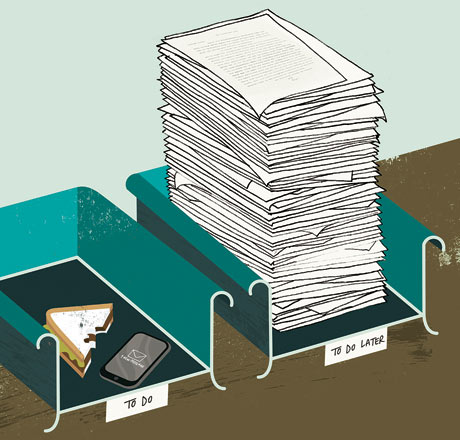
In 1995, the philosophy professor John Perry wrote an essay entitled Structured Procrastination, about harnessing the power of procrastination to get things done. Finally, he's got around to expanding it into a book. (Insert joke here.) Published in the UK next month, it's called The Art Of Procrastination: A Guide To Effective Dawdling, Dallying, Lollygagging And Postponing, and the name of the publisher is... Workman. (Insert joke here.) A word of caution: readers of the online version of this column may be tempted to leave a comment saying "I was going to read this, but I decided to put it off till later." Should you do so, I will personally come round and set fire to your house.
I mean, when I can be bothered.
The gist of Perry's approach was encapsulated by the humorist Robert Benchley: "Anyone can do any amount of work, provided it isn't the work he's supposed to be doing at that moment." As long as your alleged top priority is sufficiently intimidating ("learn Chinese"), it'll feel comparatively fun to do something that's actually more important ("finish philosophy paper"). Perry recalls his time as a "resident fellow" at Stanford, when he'd put off grading essays to chat and play ping-pong with students – which made him a good resident fellow. Structured procrastination, he concedes, relies on self-deception. But then so do most productivity tricks; at least this one doesn't also rely on trying to stamp out an ingrained personality trait, but on channelling it wisely instead.
The book takes this harnessing-your-flaws approach further. If you crave a sense of accomplishment, Perry notes, try adding to your to-do list things you already do, so as to get the fillip of crossing them off. (He recommends a morning list: "1. Turn off the alarm. 2. Don't hit the snooze button. 3. Get out of bed. 4. Go to the bathroom. 5. Don't get back into bed" – five achievements before you've made coffee!) And he celebrates the wondrous phenomenon of Tasks That Just Go Away: delay on certain things and circumstances will render them irrelevant. Sure, you should avoid being "manipulative and annoying" by forcing others to fulfil your duties out of desperation. But in any sizeable organisation, there are often several people who could complete a given task. Why should you always be penalised for being helpful?
So far, so jovial. But Perry's approach touches on something that's missed by most psychologists: the rebellious urge underlying procrastination isn't always a bad thing. To delay doing what we want to get done seems flatly irrational. Yet such perversity can be an assertion of human autonomy: something a person does, as Dostoevsky writes in Notes From The Underground, "to prove to himself... that men are still men and not the keys of a piano, which the laws of nature threaten to control so completely". Perry himself disdains such grand explanations. But seen this way, today's cacophony of anti-procrastination advice seems rather sinister: a subtle way of inducing conformity, to get you to do what you "should" be doing. Structured procrastination turns your rebellion into productivity, so you could argue it's equally conformist. But at least it respects the existence of the urge. And it doesn't let you forget a truth that most productivity gurus ignore: that just because something found its way on to your to-do list, it doesn't necessarily follow that it needs to be done.
oliver.burkeman@theguardian.com Follow Oliver on Twitter.

